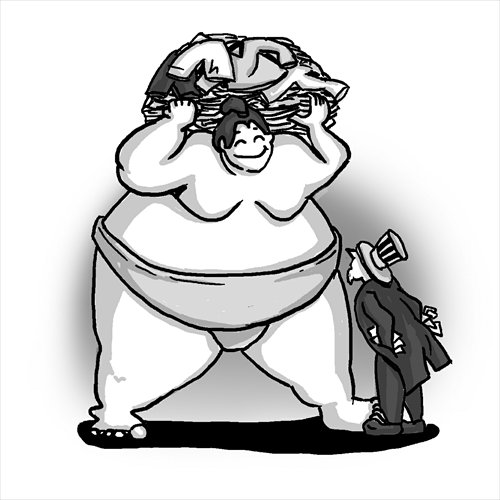Fast Retailing sets high bar with expansion plans

Illustration: Lu Ting/GT
Japan's Fast Retailing Co Ltd, the parent company of fast-fashion retail chain Uniqlo, ended talks last week to buy US apparel retailer J.Crew Group Inc, according to media reports. Although the deal may have fallen through, it is an indication of Fast Retailing's global expansion strategy as the brand strives to become the world's top apparel retailer by 2020.
News broke last week that despite Fast Retailing's interest in a deal with J.Crew, it finds the price tag of $5 billion asked by the American company too high. Analysts say the hefty amount valued J.Crew at 17 times over earnings, more than double the valuation of typical merger & acquisition (M&A) deals in the retail industry.
M&A opportunities, such as a deal with J.Crew, are an important part of Fast Retailing's international expansion plan. They serve to promote brand awareness of Uniqlo among US consumers as the Japanese company is still not as well-known in the North American market as its competitors Gap and H&M.
Fast Retailing recently announced a dual target: to achieve annual group sales equaling 5 trillion yen ($49 billion) and become the largest retailer in the world by 2020. To achieve these goals, the retailer has to look beyond its home market. Indeed, global markets have become key drivers of growth for the group's cornerstone brand Uniqlo. According to information on Uniqlo's website, international markets accounted for about 27 percent of its total sales by August 2013.
Rapid worldwide expansion has thus far proven to be a successful strategy for Fast Retailing. Sales increased 23 percent year-on-year to 1.143 trillion yen in 2013, while net income rose by 26 percent to 90.4 billion yen over the same period. The company plans to open between 200 to 300 stores per year around the world, and expects overseas sales to exceed domestic sales in 2015.
However, past lessons are making the Japanese retailer more prudent with its expansion plans, which now rely more on working with local retailers. Fast Retailing flopped with its first US excursion in 2005, when it opened and then quickly closed three Uniqlo stores in the country. But a possible deal with J.Crew allows Uniqlo to take advantage of J.Crew's network in the US, potentially sparing it the trouble of opening stores from scratch. J.Crew had 330 retail stores in the US as of February, according to its website.
But apart from Uniqlo, Fast Retailing also owns the more high-end American fashion brands such as J Brand and Theory, both of which have proved valuable additions to the Japanese company's portfolio. For example, denim wear label J Brand, which was acquired by Fast Retailing in 2012, has been credited for helping Uniqlo with its jean trouser designs, Fast Retailing group executive vice president Yoshihiro Kunii told Reuters.
The Japanese retailer started its second attempt to crack the US market in 2011 and plans to open at least 20 stores in the US this year, said US chief operating officer Larry Meyer. Currently the retail chain operates 17 stores in New York and San Francisco, and is considering plans to open shops in Boston, Philadelphia, southern California and the Midwest in coming months.
Uniqlo reported operating losses at its US division in the six months to February of last year, according to a report published on the International Council of Shopping Centers' website. However, the strategy of opening more new stores and promoting its brand name, if it truly works well, could help the retailer to break even this year, said the report.
China, meanwhile, is still the primary foreign market for Uniqlo. The Chinese mainland has 260 stores and sales of 7.5 billion yuan ($1.2 billion) last year, equaling 10 percent of global sales. And Shanghai's flagship store, opened in September last year, is the largest Uniqlo outlet in the world.
As a further step to promote the brand in the country, the Tokyo-listed Fast Retailing had a secondary listing in Hong Kong on March 5 by issuing depository receipts, which allow investors to buy Fast Retailing shares in Hong Kong dollars instead of yen. The aim of the secondary listing is not to raise funds but to boost its profile in China and Asia, said the company.
Uniqlo has also started to tap the European market. The chain is set to open a flagship store in Berlin in April which is planned to be Uniqlo's largest location in Europe. Meanwhile, the company has already managed to carve out a strong presence in London, Paris and Moscow.
Uniqlo is one of the success stories of Japan's retail industry. I was told recently by a Shanghai businessman who operates an electronic components factory in Japan that the most popular brand in Japan right now is not electronics giants like Sony or Hitachi, but Uniqlo. Its reasonably priced clothes are must-haves in the closets of Japanese homes because the brand caters those who prefer to spend more carefully on clothes during periods of economic uncertainty.
But the brand owes its success not only to its inexpensive apparel. As part of its marketing strategy, Uniqlo frequently invites celebrities and renowned fashion designers to participate in cross-over projects aimed at attracting young fashion lovers. Besides the ongoing sponsorship for men's tennis star Novak Djokovic, the latest such collaboration saw the launch of T-shirts designed by American singer and music producer Pharrell Williams in April.
From a suburban roadside store started in Japan in 1984, Uniqlo has established itself as one of the most-recognized and admired fast-fashion brands in the world, with more than 1,300 stores across 14 countries worldwide. But continuing its success will require it to partner with overseas retails which can help Uniqlo connect with foreign consumers.
The author is an editor with the Global Times. bizopinion@globaltimes.com.cn